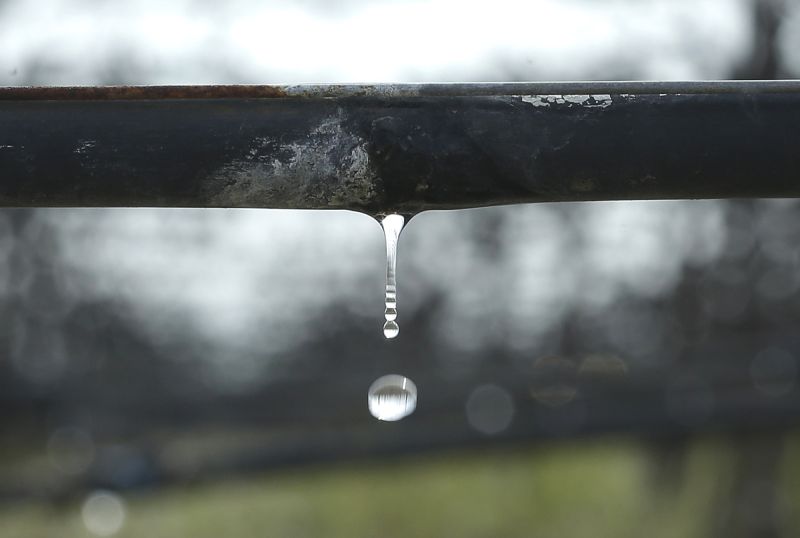
Delegates and activists from nearly 200 countries returned from the COP26 global environmental forum in Glasgow, Scotland, with a long list of climate-related promises and targets to discuss and implement. While many countries made a renewed commitment to climate-resilient and sustainable agricultural systems, some groups accused leaders at COP26 of not doing enough to improve water security globally.
The need for a climate-resilient food system — one that addresses both current and future climate threats, including water shortages — has never been more important. A recent alert from the United Nations, for example, warns about one of the world’s first climate change-induced famines in Madagascar. World Food Programme experts note that famine situations like this are just “the beginning of what we can expect” in the future.
Water conservation has a greater role to play
There’s also increasing pressure in the United States to build a more climate-resilient food system, in recognition of the threats to the food supply from climate change and environmental degradation. California’s persistent droughts, for instance, give water conservation methods new urgency — as the state’s massive agricultural industry accounts for 80 percent of California’s water usage.
Since agriculture accounts for 69 percent of water use globally and 36 percent of overall water use in the United States, policymakers are eager to reduce freshwater demand. Boosting the use of recycled water within the U.S. agricultural sector might seem an obvious solution, but farmers — including greenhouse growers — have been reluctant to use recycled water. Why is that, given the urgent need for water conservation in agricultural production?
Recycled water sparks the “yuck factor”
Scientists have long noted that both farmers and the general public tend to disapprove of recycled water — that’s because of a condition called the “yuck factor,” when people believe that recycled water is unsanitary. Would improved educational outreach overcome some of the hesitancy to reuse water, if people understood how recycled water works and why it’s safe to use?
General education efforts may not address the root causes of farmers’ resistance to using recycled water, our research explains. When scientists and policymakers talk about recycled water, they are referring to municipal treated wastewater — water that begins as sewage and transforms to recycled water through a highly regulated process at a wastewater treatment plant. Farmers don’t always think about recycled water the same way as scientists and policymakers, however.
In a recent article, our research team explored farmers’ knowledge about recycled water and how it might explain their resistance to adopting recycled water irrigation practices. Between spring 2019 and winter 2020, we surveyed 285 greenhouse growers across the United States to measure their knowledge, perceptions and willingness to use recycled water within greenhouse production.
We found that 73 percent of the respondents had not used recycled water. Most growers (83 percent) expressed an initial willingness to use recycled water on nonfood crops such as ornamental plants. However, their willingness dropped to 36 percent if recycled water could come in direct contact with food crops.
We then asked growers what they thought “recycled water” meant. The growers in our survey defined recycled water in terms of captured water (48 percent) such as harvesting rainwater runoff, treated wastewater from their own operations (26 percent), and recirculating systems like hydroponic irrigation (15 percent). These descriptions reflect the water-recycling practices growers themselves follow — but only 10 respondents (3 percent) defined recycled water as municipal treated wastewater.
Our study shows that growers’ perceptions of recycled water were greatly informed by their own experience with recycled water. Most growers who described recycled water as “captured water” or “recirculation” also viewed this water as contaminated with bacteria or viruses.
These findings suggest part of the reluctance to adopt recycled water in their greenhouse operations may be rooted in the different ways that farmers perceive that recycled water is produced and potentially unsafe. This gives important clues on how to tailor educational outreach to address these misunderstandings — and ultimately get more farmers to use recycled water.
Targeted information may help get farmers on board
To be sure, this study explores recycled water knowledge among one subset of the agricultural sector: greenhouse growers. However, it’s important to understand farmers’ perspectives because their decisions about water use are important for food production — and longer-term resiliency to climate change.
Troubling climate projections suggest global freshwater supplies will come under increasing threat. In the United States, the need for greater water conservation is equally important. Our findings show that there is a disconnect between scientists, policymakers and the public around a general understanding of recycled water. If policymakers hope to get everyone on board with efforts to increase recycled water usage, investing in diverse and targeted informational outreach to broaden the understanding of climate resilience and emerging technologies will become even more important.
Chesney McOmber is a postdoctoral research fellow at the University of Connecticut. Christine Kirchhoff is an associate professor in the department of Civil and Environmental Engineering at the University of Connecticut
